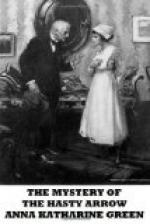Then comes the benediction, and with the falling of those holy hands, a headlong rush into the open air—a vision of flying forms here, there, and everywhere—men staggering under foolish burdens—women on their knees with arms lifted to heaven or flung around their babes—hope lost under the bowing mountain; and in the midst of it all, plain to the view of all, the stranger’s horse and carriage which, standing there, stamped with undying honor these terrified villagers, who had seen and not touched them though Death had them by the hair.
* * * * *
“Quick! quick! You mother there with the child, get in, get in; there is room here for one more.”
But another got the place. The driver, reeling as he ran, sprang for the empty seat and hung there between the wheels as the horses plunged and tore away to safety just as the great mass with its weight of gathered boulders and uprooted forests crashed in final doom upon that devoted village, burying it from sight as though it had never been.
To safety? Yes, for two of them; the other, struck by a flying stone, fell in the road and was covered in a trice. So close were they to destruction’s edge at this moment of headlong flight.
* * * * *
Not till the painted towers encircling Lucerne had come again into sight did the newly wedded pair find words or make the least attempt to speak. Then Carleton kissed his bride and for a moment love was triumphant. Was it triumphant enough to lead him to acknowledge their marriage? She looked anxiously in his face to see and finally she asked:
“How much of this are we to tell, Carleton?”
“All about the catastrophe; but nothing more,” he answered.
And while her heart retained its homage, the light in her eyes was veiled.
Married but not acknowledged! Would it not have been better if the avalanche had overwhelmed them? She almost thought so, till bending, he murmured in her ear:
“I shall follow you soon. Did you think I could go on living without you?”
* * * * *
“Why so thoughtful, Ermentrude? You are not quite yourself to-day?”
“Uncle is very ill. The doctors say that he may not live a month.”
“And does that grieve you?”
A yes was on her lips, but she did not utter it. Instead, she drew a little ribbon from her breast, on which hung a plain gold ring, and gazing earnestly at this token she remarked very quietly:
“Carleton, have you ever thought that but for this ring no proof remains in all this world of our ever having been married?”
“But our hearts know it. Is that not enough?” he asked.
“For to-day, yes. But when uncle goes....”
His kisses finished the sentence for her, and love resumed its sway; but when alone and wakeful on her pillow, she recalled his look, the sting of her first doubt darted through her uneasy heart, and feeling eagerly after the ring she tore it from its ribbon and put it on her finger.




